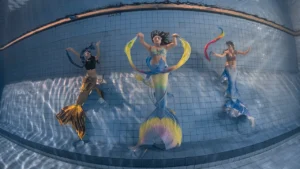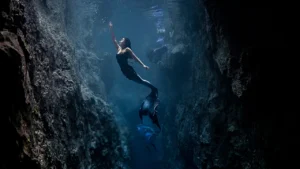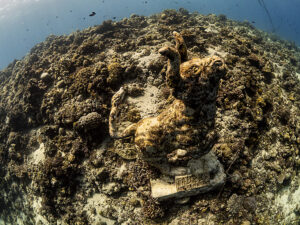by Nicholas Kouvaras
What is freediving?
In theory it is any kind of activity that takes place underwater while we hold our breath. For me it is more something like a tool. A skill set that we can use anyway we like when we are in the water.
Some freedivers like to compete and try to stay longer, go further and dive deeper. Some people use freediving to make a living out of the ocean, like the Sama-Bajau tribes in the Philippines and Indonesia. I know a lot of people who use freediving just to overcome their fear of the water. For me it was always photography. I loved taking pictures of fish when I started.
In scuba diving we learn how to use our equipment. In freediving we learn how to use our body and the mammalian dive reflex. Teaching freediving is the easiest thing in the world. Our bodies are equipped with the same mechanisms as dolphins, whales and seals. Our bodies know what to do. Our brain has forgotten. My favourite part of any course is when people realise that they can hold their breath longer than they could imagine. When the dive reflex kicks in and being in the water becomes comfortable.
How can someone learn freediving?
Like all recreational activities in Freediving we take things one step at a time. We start with the theory. Our main focus here is to understand how the body works when we hold our breath. Then we talk about breathing. Controlling the way we breath and properly using all our breathing muscles is about 80% of freediving.
Now we are ready to get in the water. The first thing we are going to try is static apnea. The goal is time. We just lie face down, completely still in the water and we focus on our body. Relaxation is the key. The more relaxed we are, the less oxygen we use the longer we can stay.
When we get comfortable with the breath hold we will combine it with moving through the water. We call this dynamic apnea and the goal is distance. What we try to do is to swim underwater in the most efficient way. Static and dynamic apnea practice takes place in the pool or in confined waters.
The next step is the sea. We first try what we call Free Immersion. Which is just a fancy way of saying pulling down and up along the line. We use the guide line to pull ourselves down and back up. It is the most controlled way to dive and a great way for practising our equalisation.
Equalisation in freediving is a bit tricky. The head down position, the speed of the descent and the short supply of air require a bit of practice before we get a good rhythm.
The end goal is to be able to dive down using our fins and swim back up. We call that a constant weight dive. Yes, I know, lots of fancy terms. This is the last thing we practise along with the safety drills.
Why would an underwater photographer learn to freedive?
90% of the time taking pictures UW is a lot easier on Scuba but there are cases where it is better to do it on breath hold:
UW modelling in a pool or very shallow waters. Communication here is very important. Being able to talk to your model after each shot and show the shots makes things a lot easier.
Diving in really remote areas or from small boats. When you are exploring new areas it is not always easy to have a compressor around. Carrying gear through a Jungle or down a cliff might not be possible. Getting into the water with big surf can be tricky with all the scuba equipment.
Big Marine life. Whale sharks, Whales, Giant mantas, Dolphins e.t.c. Most of the shooting happens close to the surface and mobility is more important than dive time. Being able to be in the right spot at the right time and getting the right angle is very important.
Split frames. For obvious reasons.
Even when we scuba dive there are benefits to having good freediving skills.
- Learning how to control your breathing will do wonders on your buoyancy control.
- Moving better through the water will help you move quietly and get closer to marine life.
- Relaxation improves focus and peripheral vision. Both key elements to UW photography.
- All the above reduce drastically air consumption.
What are the advantages of freediving in UW Photography?
Quiet Mobility. Moving through the water is very smooth. You can swim faster and with a minimal footprint. Getting closer to marine life is a lot easier.
You can go up and down all day. You can freedive all day. If you are not diving deeper than 30 metres, a very simple rule of thumb is keeping your surface intervals twice as long as your dive time. With that in mind and if you keep yourself well hydrated you can spend tons of time in the water.
Exploring. You can cover more distance and spend more time looking for interesting spots. Especially when the visibility is good you have a lot more chances of discovering photogenic places and marine life.
Posing. If you want to be in front of the lens, trust me you look a lot better without the scuba gear.
What are the disadvantages of freediving?
Depth and dive time. The deeper you go the less time you have at the bottom. Normally the bottom time of a freediver is measured in seconds.
Need for minimalism. Big cameras, Big ports, Long arms and Multiple light sources are not possible. Small cameras, fisheye lenses behind small ports and using the natural light is usually the way to go in freediving.
Need for intimacy with your camera. The short bottom times and the low oxygen levels are not the best combination to change settings in your camera. Set the camera on the surface and adjust according to the previous shots. Knowing the camera well is a big plus.
Macro is possible but not fun. I did it a couple of times out of spite because people told me it is not possible but I am not looking forward to doing it again anytime soon.
Fatigue. Yes it is tiring. You can dive all day but you need to be really fit if you want to spend more than 2 hours in the water.
Cold. Freediving wetsuits are designed with comfort in mind. If you are diving in cold waters your time in the water is limited by hypothermia. Dry suits don’t work in freediving.
Regardless of how you dive, being in the water is magical. Sharing these magical moments makes the experience even better. Enjoy the oceans and take great pictures.
My name is Nicholas Kouvaras. I am a freediving Instructor based in Jakarta Indonesia. I was born and raised on the island of Paros in Greece. I swam, sailed and dived since I can remember. I got my first UW camera in 1978 at the age of 9, a Minolta Weathermatic. I never stopped taking pictures after that. I always Freedived and have been the captain of the Greek National freediving team for some years. But I found my calling in teaching and training. I became a full time Instructor in 1998. I also worked for a while as a freelance photographer for Greek diving magazines but most of my photography happens when I teach. I always take pictures of my students. I have worked in Athens, Crete, Kalamata, Bali, Cebu, Menorca and now in Jakarta.
I now use an Olympus OM-D E-M5 Mark III with the Olympus M.Zuiko Digital ED 8mm f/1.8 Fisheye PRO Lens behind a 4.33’’ Dome port in a Nauticam housing.



